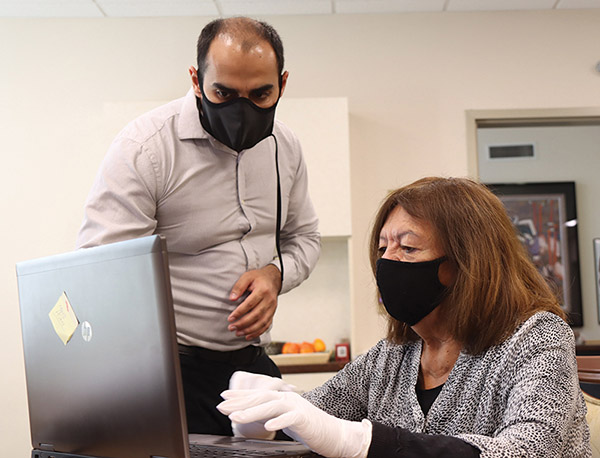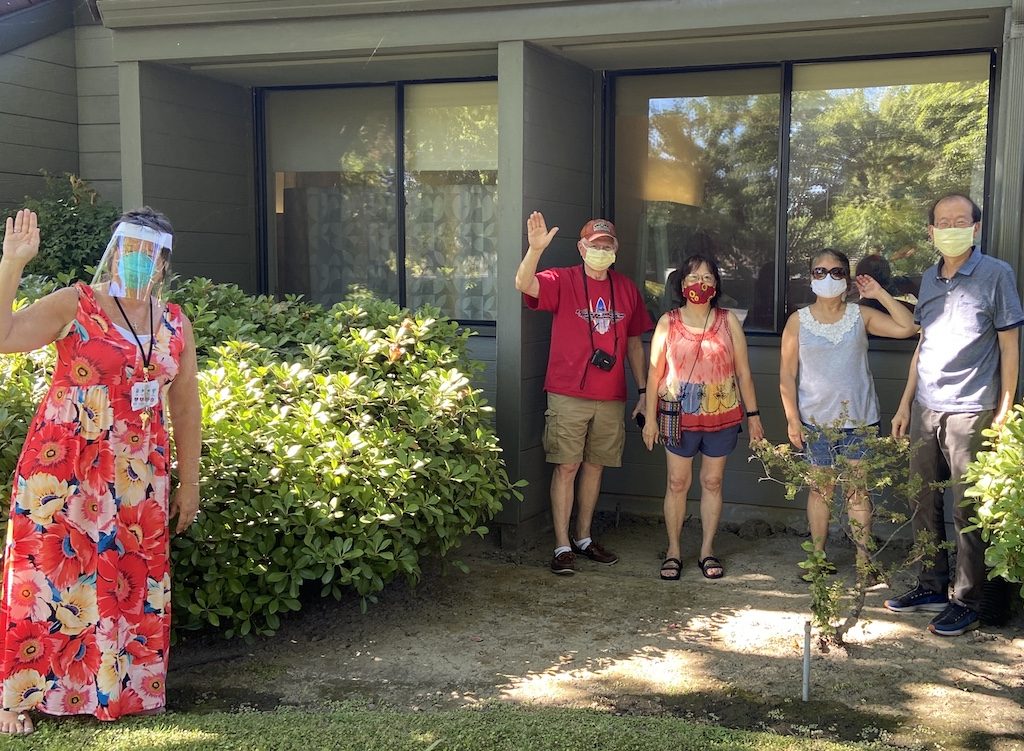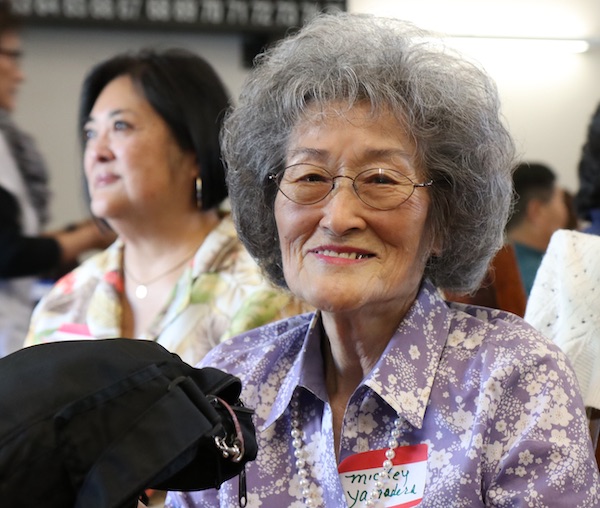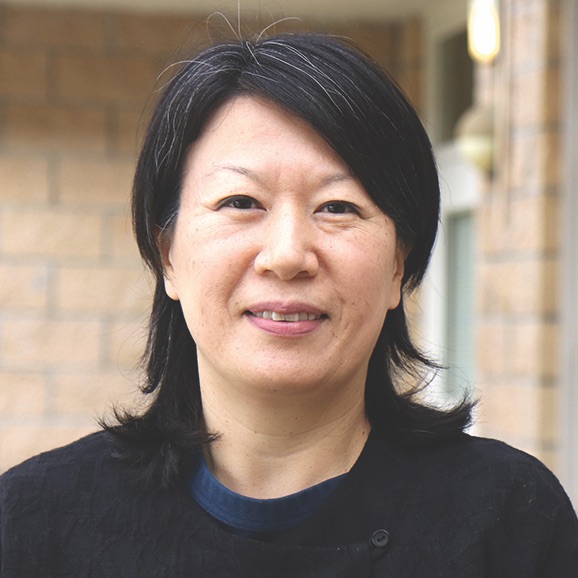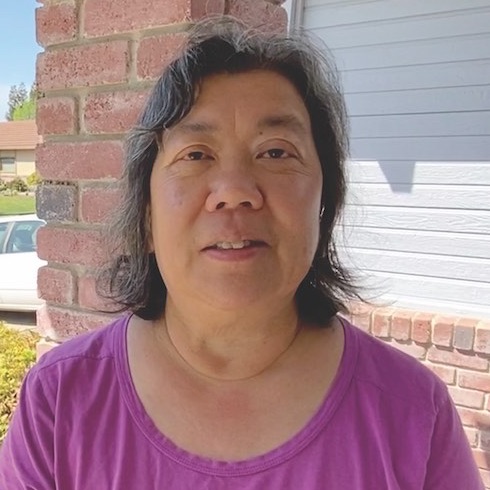By Corky Mau
It was a cold, grey day when I sat down to talk to Karen Weisner and Barbara Breisemeister, Illa Collin’s daughters. Illa, a former Sacramento County Supervisor, lived at ACC Care Center for several years and recently moved into the skilled nursing “Green Zone” at ACC Maple Tree Village.
Illa was elected to the Sacramento County Board of Supervisors, representing District 2, in 1978. During her 28-year tenure, Illa championed the preservation of Sacramento County’s open space lands. She helped create the Sacramento Tree Foundation and the American River Parkway Foundation. She was instrumental in getting Sacramento’s light rail system established. Former colleagues, including Congresswoman Doris Matsui, describe Illa as “one of Sacramento’s most distinguished citizens and an extraordinary woman.”
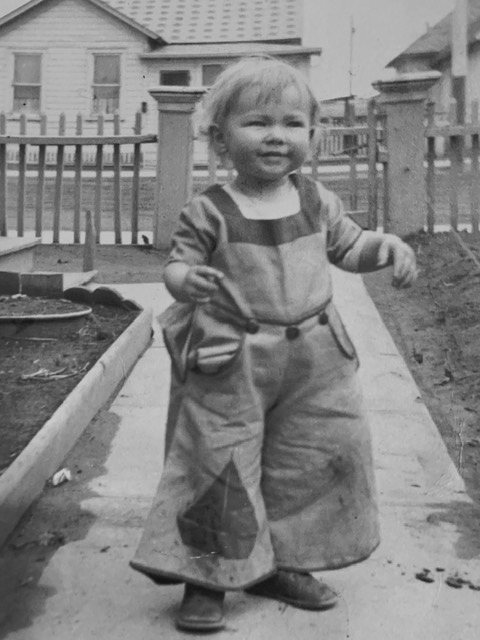
Illa had a great working relationship with ACC’s then President, Chewy Ito. Recalls ACC former Board Chair Winston Ashizawa, “Illa helped clear the way for ACC to use Bingo as a fundraising method. She was deeply interested in the Asian community and always found time to attend ACC fundraisers and other events. It’s just amazing how her friendship with Chewy has come full circle, as both are now residents at ACC Maple Tree Village!”
Illa retired in 2007, but stayed busy with other personal projects, such as volunteering with Rebuilding Together (a nonprofit that helps low-income homeowners with necessary repairs). Her dedication to the Sacramento community is evident as several sites in the region bear her name: the Illa Collin Preserve (Mather Field), Illa Collin Early Learning Center (a Head Start school), and the Illa Collin Park in South Sacramento.
Illa Collin was born January 24, 1932, in Rock Springs, Wyoming. After her father passed away in a mining accident, her mother moved the family to Portland, Oregon. She attended the University of Oregon, where she met her husband, Don. “My mother must have been really smitten, because she broke off her engagement to another fellow, to pursue Dad,” said Karen.

After graduation, Illa taught school in Portland. Even though Don was involved with the Young Republicans and Illa was a staunch Democrat, theirs is a lifelong love story. They got married on July 12, 1957, in Portland. After their honeymoon, the couple moved to California. Don attended law school at Cal Berkeley, and Illa taught school in Piedmont. They raised their three young daughters (Karen, Anne, and Barbara) in Berkeley, Oakland and El Sobrante before settling down in Sacramento in 1968.
I’d be remiss if I didn’t mention the family’s “fourth daughter,” Clarabelle, the family cat. Illa found Clarabelle, then a flea-ridden kitten, in a park after leaving a business meeting. The cat still holds a special place in Illa’s heart. Clarabelle lived a long (18 years), happy life with the Collin family.
It was clear from the family photo albums that Illa was the consummate community volunteer – from school PTAs, Girl Scouts, to local politics. She worked on several local political campaigns. She was active in the Women’s Movement and from 1973-1975, led the League of Women Voters in Sacramento. She strived to improve social service programs, especially to underserved areas of the county, before her stint as a County Supervisor.
Both Don and Illa had busy work and community meeting schedules. There were many times that they forgot to pick up their daughters from school. “We often tell people that we were the original latch-key kids…without the key,” said Barbara. The sisters erupted in loud laughter as they recalled, “When we got older and could walk home by ourselves, we’d wait in the garage for mom or dad to come home. Thank goodness there was a bathroom in the garage!”
Even though Illa was busy with her civic duties, she carved out time for her daughters. She planned their birthday parties and sewed all of their holiday outfits and Halloween costumes. To this day, all the Easter bonnets she made for the girls are safely stored away. Illa read to her girls most nights. Barbara recalls, “I had three favorite books. I made my mother read them to me night after night. This is my fondest memory of my mother.” Now the grandchildren have inherited these childhood books, as well as Illa’s vast collection of Beanie Babies (over 100).
In recent years, Illa has experienced health issues. But she still has her famous beaming smile, even during these challenging times when visits from family and friends are very limited. Linda Revilla, now Director of Programs at Meals on Wheels, recalls a touching story about one visit from Don Collin. In keeping with safety protocols, the couple couldn’t be in the same room or hug each other. But they lovingly “touched hands” through a window. There wasn’t a dry eye among the staff.
Today, Collin spends her days watching the NHK channel, old movies and listening to music. Illa’s favorite musicians? Gene Autry, John Denver and Johnny Cash to name a few.
Barbara adds, “She loves any black and white movie – a good whodunit or comedy. She is a MAJOR fan of Star Wars – she’s seen all the movies.” In fact, the family home has a dedicated ‘Star Wars Room’ that now houses almost 100 figurines and movie paraphernalia. Illa’s entire collection actually numbers closer to 500 pieces, but most of it is in a large storage container and several pieces are in Illa’s Maple Tree Village apartment. Last year, Illa convinced ACC to have a Star Wars Halloween party. The family loaned a lot of their collection to ACC for the event. Illa had planned to attend the party as Darth Vader. Unfortunately, she got sick and spent that night in the hospital. But the family draped the costume over Illa, so she didn’t miss out on the festivities.
Barbara insisted I drink the special green tea from Frank Fat’s – the family’s favorite restaurant – as I listened to more stories that revolved around food. Don was the chef of the family, as “Illa just didn’t seem interested in learning how to cook”. As soon as they returned from their honeymoon, he began studying Julia Child’s cookbooks. This came in handy as the couple often entertained family and business associates. But Illa had some cooking skills. Karen said, “Mom was the worst cook in the world, but she always made and decorated our birthday cakes.” Illa often whipped up family favorites like Chicken Bits & Pilaf, French Breakfast Puffs, and Chugwater Chili. Try this famous Wyoming-based recipe, which includes Illa’s secret ingredient (V8 juice):
Ingredients:
- 2 lbs. of lean ground beef
- 2 (15 ounce) cans of pinto and/or kidney beans, undrained
- 2 – 3 (5.5 ounce) cans of V8 juice
- 3 Tbl. Of Chugwater Chili Seasoning
Instructions:
- Brown the ground beef, breaking it into small pieces as it cooks.
- Add in Chugwater Chili Seasoning; mix well.
- Add in the V8 juice.
- Give the mixture a good stir; now add the beans.
If you want a thicker chili, drain the beans first. Simmer for 30 minutes, stirring occasionally. And if you happen to run into Illa at Maple Tree Village, let her know you made her chili recipe. She’ll be thrilled and thank you with her beaming smile.




